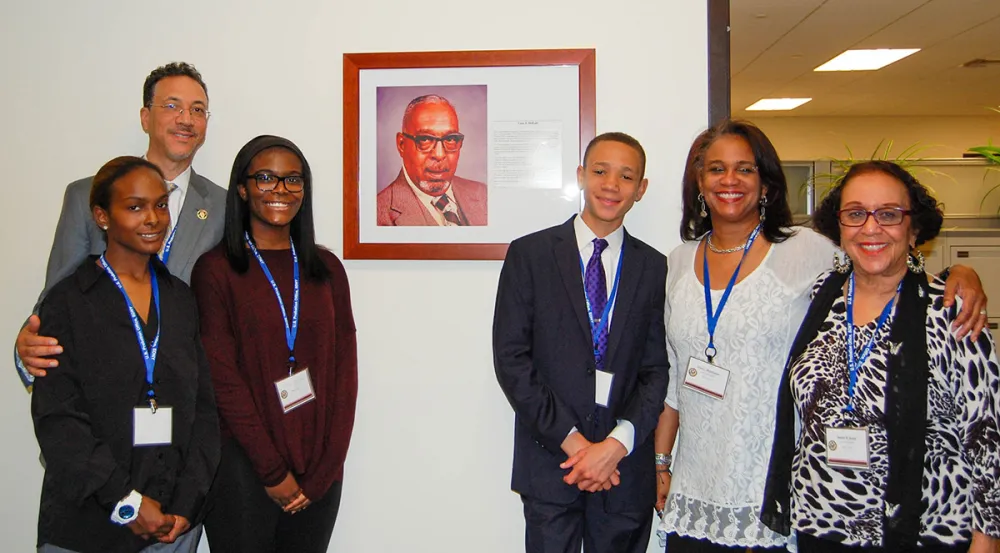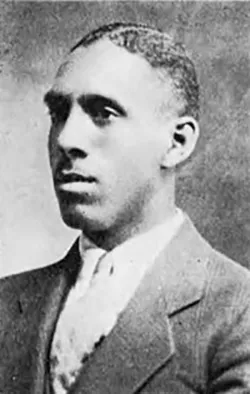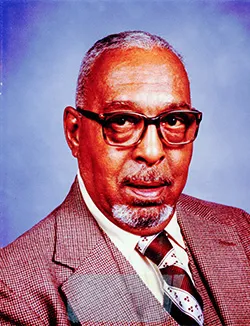
Leon E. DeKalb’s family members pose with a photo of him during a 2016 ceremony honoring probation officers in the Southern District of New York. At far right is his daughter, Helen, accompanied by granddaughter, Lisa (second from right), grandson, Michael (far left), and three great-grandchildren. Photo courtesy of the Southern District of New York Probation Office.
Leon Elmer DeKalb made history nearly 80 years ago when he became the first African American probation officer in the federal court system. He was appointed on Dec. 1, 1941, just before the United States entered World War II, and went on to a distinguished career in the Southern District of New York, where he rose to the position of deputy chief probation officer.
Officers in the Manhattan-based district and around the country are honoring DeKalb’s memory during February’s celebration of African American History Month.
“To be the first Black officer in the entire federal system couldn’t have been easy,” said Michael Fitzpatrick, chief probation officer for the Southern District of New York. “I’m sure he faced a great deal of resistance, but Mr. DeKalb overcame those challenges. He spent his career finding ways to help people struggling to successfully reenter society after prison and served as a role model to many of the officers here in New York Southern over the years.”

Leon E. DeKalb, as a young man. Photo courtesy of the Southern District of New York Probation Office.
DeKalb, who died in 1994, was a pioneer who had a profound influence on the federal probation system. He helped advance the notion that officers, in addition to their law enforcement roles, could help people struggling with drug and substance abuse. He was an instructor for the Federal Judicial Center, helping newly appointed judges understand the workings of the pretrial and probation system. He was on the board of the National Council on Crime and Delinquency, a research organization focused on making the justice system more equitable.
DeKalb is also remembered as an important mentor to young minority officers.
Yvonne Samuels, one of the first Black women to become a probation officer in the district, still remembers touring the courthouse with then Deputy Chief DeKalb on her first day of work in 1974.
“I was questioning my decision to leave my higher paying probation job for a career in federal probation, and speaking with Deputy Chief DeKalb reassured me that I made the right decision,” Samuels said. “He was a very kind person who cared deeply not only for his fellow officers, but for the offenders that we worked with. Although he never mentioned that I was Black, I could tell that he was especially interested in making sure that I and others who looked like me had the tools we needed to succeed.”
Born and raised in New York City, DeKalb graduated from DeWitt Clinton High School in the Bronx. He went on to earn a bachelor’s degree from Lincoln University in Pennsylvania, and a master’s degree from Columbia University during the peak of the Great Depression.

Leon E. DeKalb, 1974. Photo courtesy of the Southern District of New York Probation Office.
At Lincoln University, he befriended Thurgood Marshall, the future first African American U.S. Supreme Court justice. Marshall was DeKalb’s mentor in the Alpha Phi Alpha fraternity.
Before joining the probation office in the Southern District of New York, DeKalb was a New York City probation officer. He also spent time as teacher in Virginia and North Carolina and as an education advisor and welfare worker.
When war broke out, his career in probation was interrupted by two years of service in the Army, where he earned the rank of second lieutenant. In 1972, DeKalb achieved another historic first by becoming the first Black deputy chief probation officer in the federal system.
He retired after 33 years of distinguished service in 1974 and died on April 23, 1994, at the age of 86.
“Even at the age of 83, I can still remember Mr. DeKalb telling us, ‘Don’t give up. Keep trying,’ whenever things got tough for one of us in the office,” Samuels said. “We worked hard to build trust with the individuals we worked with. It was, and still is, important for them to feel comfortable confiding in us, so that we can better help them stay on the right path.”
Subscribe to News Updates
Subscribe to be notified when the news section is updated.
